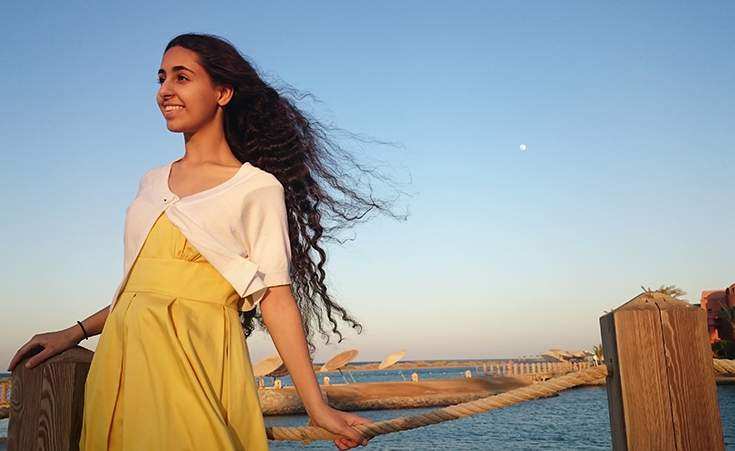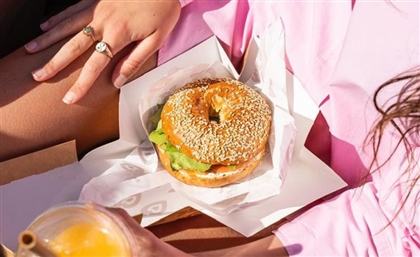How This 17-Year-Old Egyptian Invented a Product That Could Save Lives Around the World
We speak with Deena Mousa, the prodigal high-school student who invented a mixture of chemical components that can stop severe bleeding faster than the medicines currently used in hospitals.

“I emailed a lot of labs and a lot of universities, asking them to let me do the research, but, I got a lot of rejections just because I was young,” says Deena Mousa. At 17, the Egyptian student invented a medical composition that could stop severe bleeding at a faster ratio than the medicines used in hospitals.
One day, it happened. It was in New York, where she resides, in a lab at the Albany College of Pharmacy – one that finally agreed on hosting her, provided that she worked as an assistant for a year in their lab. It was only after a year’s lapse that she would be able to use their equipment to develop her own research project. “It was really exciting, and I got to design the whole thing on my own,” says the young researcher, who is planning to study molecular biology in university next year after fast-tracking through high school.
Having found in research science her biggest passion, Mousa became interested in treating wounds, as she wanted to “do something that impacted a lot of people but was not getting attention in the science world.”
“I had started doing research on blood loss and the ways we can stop it, because it is the second leading cause of death in hospitals and clinics,” she says. Her product, called Hemostat V-Seal, stops bleeding of lethal wounds in between seven and ten seconds, a ratio that is considerably faster than the one currently available in hospitals. “With the current standard of care we use now, it takes 15 minutes, which translates into litres of blood lost,” she adds.
“I first looked at how the current standard of healthcare works, and learned that there’s a whole hemostatic process by which a clot is formed. So, in hospitals they accelerate one step in that process. But I thought that if I could create something that could accelerate each and every single step within the single process, it would be much more effective,” she explains. “After a lot of testing and trials to discover the optimal ratio, I came up with a product that was faster and more efficient than what we use now.”
The lapse between ‘I really want to research’ and ‘I found the component’ was only 18 months. She did it in a borrowed lab, alone, at 16. “Even if it’s the biggest wound, across your neck, within 10 seconds it will be completely clotted. It’s a liquid drop, and even for the most sever wound, it would require around five drops. It’s both efficient and incredibly cost-effective, as it costs cents to make,” she explains.
Having created Hemostat V-Seal as her school’s final project, the researcher secured the pre-patent last year, and filed two provisional applications for the final patent in the USA. As she now processes the FDA (the US Food and Drug Administration) approval, Mousa aspires to introduce it to the market in the coming months.
“I think the problem is that most people working in this field – which are not a lot – are looking for one miracle compound – one thing that will stop bleeding very quickly. But no one had thought of combining several different compounds that can work together synergistically. That was something new,” she explains.
The New York-based researcher and entrepreneur visited Egypt this month to take part in the Spark Ventures Entrepreneurship Camp to build a strategy to commercialize the product in a way that benefits those who need it the most. “Now that I’ve done the R&D part of the medicine and got this product that I think works really well, I want to learn about the business and financial side so I can bring it to the market, influence, and save lives. I’m hoping that if I can succeed in one market, I can bring it to Egypt next.” The camp, a 10-day full-immersion into entrepreneurship, leadership, and business making, concluded last weekend, providing talented young entrepreneurial minds with the skills they need to make their ideas come true.
“What pushed me is my love for it – science research to me is like formalised curiosity, and it’s like being able to ask whatever question you want, be able to follow them to their resolution, and be able to come up with more question from your results. Besides, I’m lucky; my dad is in the field so I was able to work in his lab. But what drove me further was seeing that what I produced could actually have an impact and make change,” says the inspiring entrepreneur, who refuses to place financial ambitions ahead of her invention’s social role.
“I went to a business competition, and when I told them the cost, which is just a couple of cents per ounce, and my pricing point, which was rather was cheap, they said 'why would you do that? This is worth as much as a life's worth.' But I don't agree. The idea is that these services have to be available to people, especially those who need it the most. As long as you have revenue to sustain the business itself, the most important thing is to impact and influence people,” she says.
To find out more about Spark, follow them on Facebook and Instagram.
Photography by @MO4Network's #MO4Productions.
Photographer: Valentina Primo.
Trending This Week
-
Mar 29, 2025























